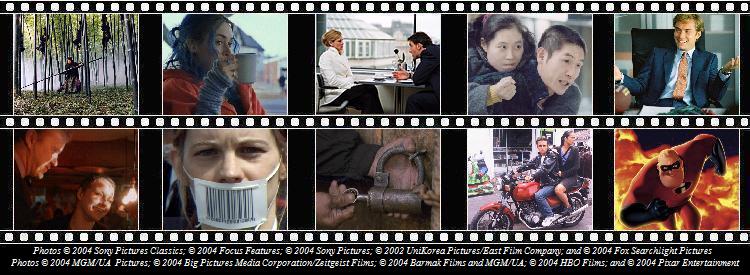
The 2004 NicksFlickPicks Honorees
No Winners, No Worries — Just a Lot of Wonderful Work!
 Check out my past honorees in 1999, 2000, 2001,
2002, and 2003
Check out my past honorees in 1999, 2000, 2001,
2002, and 2003 
I had so much fun expanding and elaborating this feature last year that the process of picking my
favorites very nearly compensated for how few films were truly worth rewarding. This year, happily, the pendulum swung so
far in the other direction that I have a new dilemma: namely, how to accommodate the crowd of deserving entrants that are
competing for the same five slots in so many categories. For that reason, in addition to the quintet of nominees in each
field, I've acknowledged two or three runners-up whom I just don't have the heart to leave out. Think of it as an embarrassment
of riches, even though for purposes of comparing my lists to others—ranging from the Oscars to
those web favorites, the FilmBitch Awards—I have
wracked my brain and wrestled my conscience to come up with the industry-standard five-member races. Enjoy!... and if you
see something you haven't seen, or haven't even heard of, by all means, whip out ye olde video-membership card or get thee
hence to a cinema near you. Life's too short to miss what's best.
· General · Directing · Acting · Writing · Visuals & Editing · Sound & Music · Effects · Stats & Extras ·
General Categories
Best Picture
Code 46
The Corporation
Eternal Sunshine of the Spotless Mind
Maria Full of Grace
Oasis
|





The uniting thread among my favorite pictures last year seemed to be that almost everyone else seemed to hate them, or at
least short-change them, or else flat-out ignore them. Among my picks this year, Eternal Sunshine of the Spotless Mind
is the box-office champ at a not-so-whopping $34 million; the NicksFlickPicks Honorees are destined never to be confused with
the People's Choice Awards. In contrast to last year, though, I at least have the sense that my favorite movies in 2004
registered strongly and positively with their audiences, however small. Code 46 and The Corporation have many
stalwart, passionate advocates within the small demographics of people who actually saw them. Oasis is riding that
huge wave of critical praise for Korean cinema, and Maria Full of Grace was a comparatively big hit on the arthouse
circuit.
If there's a theme that connects these movies, I'd say it's a poignant ambivalence about the futures of their characters, if
not the future of the world altogether. Eternal Sunshine is equal parts plucky and sad, a constant balance that culminates
into what feels like a profound emotional maturity, a sense of balance almost wholly missing from most American movies. The
fates of the characters in Oasis and Maria are ours to decide, and different viewers are likely to feel very
differently about them. The Corporation is an enormously humbling broadside against invidious practices that nonetheless
makes room for hopefulness and revivified forms of activism. Code 46 might be the bleakest of these entries, but its
vision of the Earth is so in flux that the possibility of progress isn't quite extinguished.
Honorable Mentions: Siddiq Barmak's Osama is properly unable
to incorporate any optimism into its scenario, which is a testimony to the film's brave and artful truth-telling. Jean-Luc
Godard's Notre musique, meanwhile, perfectly captures a world-weary spirit without
relinquishing the idea that something better could still arise—and that art, thought, collaboration, and serious talk
might still be the avenues for attaining it. Is Godard, deep down, still a romantic after all this time?
|
Best Non-English Language Films
Maria Full of Grace
USA/Colombia
Notre musique
France/Switzerland
Oasis
South Korea
Osama
Afghanistan
Since Otar Left
France/Georgia
|





One of the most exciting previsions in Code 46 is the decay of traditional cultural and linguistic barriers.
The dark side of that prospect is that unseen despots of the future, presumably dismayed by the
new miscegenation of languages, ethnicities, and identities, devise all new ways to punish and hierchalize the members of
this newly globalized society.
Given how many of my choices here simply duplicate the regular ol' Best Film category, the very idea of a separate "Non-English
Language" category seems gratuitous. Most of the best films produced every year are not in English. What strikes me
in particular about this assortment, though, is that Oasis is the only nominee that hails almost exclusively from a
single country of origin. Maria Full of Grace is a Spanish-language American movie, filmed in Ecuador and New York
City, featuring a cast of mostly Colombian actors. Osama, directed by an Afghani filmmaker who attended film school in
Moscow, received partial funding from European sources. Funding for Godard's Notre musique was as much an international
patchwork as is the literary conference in the film's center, where all kinds of languages are heard in the general dialogue
about the fate of the world, and Since Otar Left takes a Georgian family out of the former Soviet republic and into
France, the home country of director Julie Bertucelli. (The women who play the matriarch, daughter, and granddaughter in
Otar hail respectively from Poland, Georgia, and Russia.) In other words, cinema doesn't just speak in many languages—individual
films speak in many languages, and the polyglossia of these five remarkable movies is part of what gives them such depth and
specificity.
Honorable Mentions: Michael Haneke's international coproduction Time of the Wolf
explores the imminent replacement of national borders with
rough, desperate pockets of isolated pseudo-communities. Andrei Zvyagintsev's The Return is
about as Russian as they come, but its somewhat allegorical plot has made it a critical hit around the world.
|
Best Documentary Feature
Control Room
Jehane Noujaim, dir.
The Corporation
Mark Achbar and Jennifer Abbott, dirs.
In the Realms of the Unreal
Jessica Yu, dir.
Super Size Me
Morgan Spurlock, dir.
Tarnation
Jonathan Caouette, dir.
|





The border between fiction and non-fiction is another rhetorical convenience of film culture that doesn't hold up too well
when you start examining the movies. This is especially true in movies like Control Room, whose central topic is the
manufacturing of "news" and the inevitable partiality of all media outfits, even with regard to such grave, objective tragedies
as the ongoing war in Iraq. Noujaim's movie starts as a somewhat detached profile of the al-Jazeera news network but, following
the film's unfolding critique of the war itself and of U.S. political and military tactics, it becomes a kind of personal essay
on the themes of sincerity, honor, and truth. Of less scope than an epic inquiry like The Corporation, Control Room
is nonetheless less subjective than the fast-food picaresque of Morgan Spurlock, whose do-it-yourself blend of self-promotion
and social commentary both embodies and condemns our culture of instant gratification. (I think that paradox actually helps
the film.) And Jonathan Caouette's Tarnation,
a collage of personal memories, home-video footage, and psychadelically embellished visuals, is still more "subjective," either
departing entirely from the provenance of documentary filmmaking or reminding us just how flexible and encompassing the field
truly is. To that end, a sort of fascinating reverse case to Tarnation's plunge into the filmmaker's headspace is
Jessica Yu's In the Realms of the Unreal, a necessarily limited but nontheless fascinating and creative attempt to
pay tribute to an almost totally unrecoverable person, the mythically reclusive artist Henry Darger. With its gutsy decision
to animate some of Darger's artwork and its nicely managed blend of narrating voices, Realms is a fairly conventional
documentary that still feels eccentric, adventurous, and thought-provoking.
Honorable Mentions: I wish the movie didn't come down so hard on the cruelly oppressed sex
workers of Calcutta, but as long as it focuses on their children, Ross Kauffman and Zana Briski's Born
into Brothels is honorable and illuminating. "Honorable" is an even trickier word to apply to Michael Moore's
Fahrenheit 9/11, which at least lands enough punches above and below the belts of logic and
taste to be worth preserving...even if, as John Kerry might say, "we can do better."
|
Directing
Best Director
Julie Bertucelli
Since Otar Left
Michel Gondry
Eternal Sunshine of the Spotless Mind
Paul Greengrass
The Bourne Supremacy
Lee Chang-dong
Oasis
Michael Winterbottom
Code 46
|





Several legendary directors yielded excellent work this year, from Jean-Luc Godard's persuasive and forceful elegy Notre
musique to Clint Eastwood's subtle penetration of a bleak social milieu in Million Dollar Baby. Neither of these
scripts is the kind that guarantees a successful film; M$B could easily have been a syrupy mess, and obviously Notre
Musique is hard to imagine by anyone but Godard, so the direction of both films accounts for a good deal of their power.
Even so, the real story in directing this year was the massive outpouring
of masterly work by young and even first-time directors. Julie Bertucelli's Since Otar Left was one of two European
movies last year that described a family living a well-intentioned lie; where Wolfgang Becker emphasized the audience-friendly
comedy in Good bye, Lenin, Julie Bertucelli found even richer and rarer chords of family and national sentiment in Since
Otar Left. Michel Gondry, after the false start of Human Nature, exploded our assumptions that only Spike Jonze
knows how to bring a Charlie Kaufman script to sublime life; in fact, Jonze might be smart to crib a few pointers. Paul Greengrass
looked like a bristly artist cashing in on arthouse success until he elevated Universal's Bourne franchise into a hot-wired
diorama of our volatile globe. Lee Chang-dong kept himself at the forefront of the Korean new wave with Oasis, a massive
hit in his own country and an eye-opener in the States, and Michael Winterbottom continued his unpredictable tour of genres
and styles with his utterly inimitable sci-fi anti-romance Code 46, a marvel of challenging images, juxtapositions,
and sound design.
Honorable Mentions: I nominated Richard Linklater in this category last year for his confident,
sweet-tempered handling of School of Rock. If anything, his work on Before Sunset is
a greater achievement, distilling the form of the movie and qualifying the occasional over-reaches of the script. And in yet
another of this year's exquisite debuts, Joshua Marston drew flawless performances from the ensemble of Maria
Full of Grace and molded a beautifully proportioned tale of anger, hope, and desperation around them.
|
Acting Categories
Best Actress
Julie Delpy
Before Sunset
Esther Gorintin
Since Otar Left
Nicole Kidman
Birth & Dogville
Catalina Sandino Moreno
Maria Full of Grace
Kate Winslet
Eternal Sunshine of the Spotless Mind
|





Annette Bening, Imelda Staunton, and Hilary Swank will mostly be racing each other to the Oscar podium this year, and for all
the detail and quality in their performances, at least five actresses offered even finer performances. Delpy and Sandino
Moreno, giving two very different kinds of naturalistic performances, have collected some minor critics' awards and some
runner-up citations while Bening, Staunton, and Swank have divvied up the big prizes. Still, Delpy's neurotic effervescence
and Sandino Moreno's swallowing of her own suffering are unforgettable spectacles that elicit and earn the constant attention
of the camera. Nicole Kidman began the year with the most emotionally direct performance of her career, using her voice more
lucidly than ever before and having the guts to anchor a Lars Von Trier picture without any big mannerisms; near the end of
the year, she switched gears and nailed a Julianne Moore-style part in Birth, playing a woman with barely a shade of
knowledge about her own life and emotions. Even quieter than Kidman's Anna, Esther Gorintin's Eka in Since Otar Left
is a nearly silent character who registers all kinds of watchfulness, wry humor, and, in her character's most terrible moment,
a reconciliation to life's accidents that is really something to behold.
Standing highest among these performances, though, is Kate Winslet, who channels the robust energy typical of her characters
into the most high-strung, quivering, compassionate, defensive, perceptive character in a year of movies. Winslet's Clementine
has virtually nothing in common with any female lead in any romantic comedy of the last many years, and miraculously, the
actress coaxes the genre into meeting her performance rather than more simply submitting herself to expectations. As perfect
in its way as Barbara Stanwyck in The Lady Eve or Diane Keaton in Annie Hall, Winslet's performance is the acting
achievement of the year.
Honorable Mentions: Helen Mirren got barely a word to speak in The
Clearing, and an actor-unfriendly plotline where she basically sits and waits. She's fascinating, though, and the movie
follows suit. Imelda Staunton has a juicier character and premise to work with in Vera Drake,
but it doesn't make her tactile, lived-in performance any less of an accomplishment.
P.S.: Since completing this feature, Catherine Breillat's Sex Is
Comedy made its local premiere, and Anne Parillaud's clenched, funny, dedicated, and bravely neurotic performance as
Breillat's alter ego made quite an impression. She might not crack the top five, but she's a definite Honorable Mention.
|
Best Actor
Ivan Dobronravov
The Return
Kevin Kline
De-Lovely
Clive Owen
Closer
Sean Penn
The Assassination of Richard Nixon
Sol Kyung-gu
Oasis
|





Kevin Kline and Sean Penn faced two of the most difficult parts of their careers this year in De-Lovely and The
Assassination of Richard Nixon, putative biopics that nonetheless embroidered the histories of their characters. Both
actors managed to connect with the souls of these men and also keep up with the distinctive and sometimes unstable aesthetics
of their films. Kline, forced by Cole Porter's example into a thin, warbly voice unworthy of his songs, seemed friskier and
more dapper than he has in years, capturing the famous elegance of the man without cleaning up the nasty edges of self-doubt
and self-delusion that De-Lovely sometimes wants to explore and sometimes doesn't. Assassination, meanwhile,
is a fascinating character study whose weakest dramatic link is, of all things, the connection to Richard Nixon. There's not
much in the screenplay to explain Sam Bicke's climactic course of action, but Penn whips up such a ferrety, well-intentioned,
troublingly obtuse, but deeply understandable character that you'd believe Sam Bicke would do almost anything. If only the
other actors, save the superb Jack Thompson, didn't look so awestruck in Penn's presence, then he might have something to
play against.
The other actors in this field had the benefit of stronger overall movies (though De-Lovely and The Assassination
of Richard Nixon are hardly failures). Clive Owen has been consigned to supporting races by his savvy publicists, but
Larry is as big a part as the others in Closer, and it's Owen's arrival into the story that makes the whole quandrangle
of tortured libidos really click. Ivan Dobronravov was the child find of the year, and maybe of the decade; the rage he
uncorks when his mysterious and hard-driving father starts taking their relationship for granted was one of the purest, hottest
emotions the screen communicated all year. And Sol Kyung-gu, the wholly untrustworthy and probably demented antihero of Oasis,
pushes the camera just as bravely as Dobronravov does, challenging the audience to keep up with his creepy mannerisms and
unpredictable temperament until we are somehow, inexplicably sympathetic to his mostly self-imposed plight.
Honorable Mentions: These performances were all too good to budge, though it still feels
like an incomplete list without Paul Giamatti, whose work in Sideways was leagues ahead of
his cartooning work in American Splendor, and who obviously understands the flaws of this character even when the
director is in a rush to pretty them up. Oscar is likely to reward Giamatti with a nod, probably alongside the revelatory
Don Cheadle in Hotel Rwanda, and certainly alongside Jamie Foxx, who gave three shrewd performances
of wholly different types in Ray, Breakin' All the Rules, and,
by far my favorite (and not in a supporting role), Collateral.
|
Best Supporting Actress
Joan Allen
The Bourne Supremacy
Patricia Clarkson
Dogville
Anaïs Demoustier
Time of the Wolf
Virginia Madsen
Sideways
Patricia Rae
Maria Full of Grace
|





Can anyone think of a movie that wouldn't improve with Joan Allen or Patricia Clarkson in it? These actresses never put a
foot wrong, and even in movies that have been directed to the nines, they authoritatively own their scenes without getting
in the way of the film. From the moment Allen strides onscreen in The Bourne Supremacy, her hair blowing behind her
and her laser-beam gaze locked on everyone and everything at once, you know that the whole CIA plot that just sort of languished
in The Bourne Identity is bound to get kick-started into something really memorable. Clarkson was a last-minute
substitution for the late Katrin Cartlidge in Dogville, and as much as I miss that fearless and spirited actress, it's
hard to imagine anyone doing a better job with this part. From her handling of Von Trier's purposely artificial dialogue
to the blistering anger of her confrontations with Kidman, Clarkson conjures a rare breed of wholly mundane villainy, premised
on massive need and loneliness.
Contrasted to these two professional powerhouses, Patricia Rae and the teenaged Anaïs Demoustier were unknowns to me before
this year, but they both deserve important careers. Rae plays her part in Maria with such a blend of steeliness and
compassion that we're never quite sure how much she suspects and how much she doesn't; she ensures that the movie never boils
down to a narcissistic focus on the protagonist. Demoustier has a subtle, tricky role to play in Time of the Wolf, and
it may not be until a quiet moment with a Walkman, 90 minutes into the movie, that you realize what an incisively subliminal
portrait of adolescent grief she's been putting together throughout. Somewhere between these newcomers and the old(er) pro's is
Virginia Madsen, a familiar name who reinvents herself so fully with the bruised wisdom of her Sideways character that
she feels like a brand-new actress.
Honorable Mentions: Dinara Drukarova has a similar task in Since
Otar Left to the one Demoustier has in Time of the Wolf, playing a teenaged girl who is studying her family
members and learning to take care of herself as their weaknesses become more obvious. Yenny Paolo Vega, another youngster,
had one of the year's least enviable roles as the petulant, puggish sidekick who won't leave Maria alone in Maria
Full of Grace. This actress is brave enough to alienate the whole audience even as we realize we should be feeling
sorry for her. In this case, that's a compliment.
P.S.: Another movie I saw too late to consider for this feature was the Thai oddity
Blissfully Yours, in which Jenjira Jansuda gives a thorny, uncommonly sensual, deftly
layered performance as a bitter pill whose heart is in the right place, or else as a helpful companion who's actually motivated
by anger and hostility. The blend of malice, pragmatism, kindness, and longing in her performance runs so deep it's pleasurably
impossible to pin down the character.
|
Best Supporting Actor
David Carradine
Kill Bill, Vol. 2
Eddie Marsan
Vera Drake
Dennis Quaid
In Good Company
Min Tanaka
The Twilight Samurai
Mark Wahlberg
I ♥ Huckabees
|





The pair of aging warriors in this category might be the only characters who'd have anything to say to each other. Actually,
Carradine's Bill has something to say to almost anybody, but even when Quentin Tarantino's screenplay gets lethally verbose,
as in the endless fireside monologue about the five-point heart trick or whatever it's called, Carradine balances his smartly
self-conscious charisma and his weirdly expressive voice to keep the scenes alive. How do you play "Bill" in what is basically
a four-hour movie called Kill Bill and make yourself worth all the trouble? Carradine creates such a vivid, involving
persona that you constantly sense his danger but still wind up sorry to see him go. Min Tanaka, who plays the decrepit but
still deadly warlord whom the hero is contracted to kill at the end of The Twilight Samurai, is confined to only the
final act of the picture, but his look and demeanor are so deeply unsettling that he finally awakens this too-dormant movie
into something you want to watch.
Closer to home, Mark Wahlberg and Dennis Quaid play out different variations of suburban spiritual crisis, and both actors
remind us that comic agility and intense virility are a combination too seldom exploited by American movies. Now that the
cats are out of the bag and we know how much more these actors are capable of doing, let's hope they get hired to do
more than preen and scowl in routine action pictures and gratuitous remakes. For the time being, they can both take credit
for being the linchpins to their films, each a dramedic delight that would nonetheless fall apart if these particular
roles weren't so perfectly inhabited. My fifth nominee is Eddie Marsan, a consummate actor like so many in Mike Leigh's movies,
but the only person in Vera Drake whom I would happily have followed into his very own film. When he, the only character
not related to Vera, tries to find words to praise and reassure her, the wintry pall of the movie suddenly warms a bit, yet
without the slightest tinge of emotional manipulation.
Honorable Mentions: After last year's slim pickings, there was a gallery of strong work
in this category in 2004, also to include Liev Schreiber's lost soul of an American idol in The
Manchurian Candidate, Daniel Giménez Cacho's diseased priest in Bad Education, Daniel
Craig's deceptively needy id-monster in The Mother, and Dustin Hoffman and Jude Law rounding
out the top-notch supporting cast of Huckabees.
P.S.: And that "gallery of strong work" continues, with the usually laconic Grégoire Colin
slithering under his director's skin and under ours, too, in Sex Is Comedy.
|
Writing Categories
Best Original Screenplay
Richard Linklater, Ethan Hawke & Julie Delpy
Before Sunset
Rodney Evans
Brother to Brother
Charlie Kaufman
Eternal Sunshine of the Spotless Mind
David O. Russell & Jeff Baena
I ♥ Huckabees
Joshua Marston
Maria Full of Grace
|
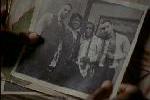 Critics and audiences have a huge, halfway understandable temptation to ascribe all of the
splendor and intricacy of Eternal Sunshine of the Spotless Mind to Charlie Kaufman's script, which perhaps explains
why he has won so many year-end critic's awards while the film itself, its director, its technicians, and its cast have all
been shortchanged. In the face of this mythology, that Kaufman somehow writes scripts that direct themselves, I am often at
pains to point out the perfect, subtle shifts in lighting schemes or the miniature brilliance that is tucked away in the corners
of the production design. All the same, it's a good thing to recall that Eternal Sunshine's glory did begin with this
script, which it's hard to imagine any other screenwriter managing to write. Sunshine lacks any discernible target
demographic and yet encompasses everyone alive within the scope of its character arcs and emotional sympathies. It's a once-in-a-lifetime
script. Critics and audiences have a huge, halfway understandable temptation to ascribe all of the
splendor and intricacy of Eternal Sunshine of the Spotless Mind to Charlie Kaufman's script, which perhaps explains
why he has won so many year-end critic's awards while the film itself, its director, its technicians, and its cast have all
been shortchanged. In the face of this mythology, that Kaufman somehow writes scripts that direct themselves, I am often at
pains to point out the perfect, subtle shifts in lighting schemes or the miniature brilliance that is tucked away in the corners
of the production design. All the same, it's a good thing to recall that Eternal Sunshine's glory did begin with this
script, which it's hard to imagine any other screenwriter managing to write. Sunshine lacks any discernible target
demographic and yet encompasses everyone alive within the scope of its character arcs and emotional sympathies. It's a once-in-a-lifetime
script.
Which isn't to say that these other nominees aren't stunning in their own right. Huckabees is so breathlessly directed
and so prone to improvisatory flourishes that you can miss what a sturdy foundation the script actually provides to its actors
and its audience: we always know what's going on, even when we have no idea what's going on, or something. Before Sunset
reprises the conversational rhythms of the earlier film with comparable payoffs, and Maria Full of Grace turns a storyline
ripped from the headlines into a genuinely humane drama, rather than just a posterboard for a cause or a character type. The
most unsung of these five nominees was Rodney Evans' Brother to Brother, an ambitious paean to both the artistic and romantic rebellions of the Harlem
Renaissance as well as the intersections of race, class, and sexuality in one college student's life in modern-day New York City. The
reach of this script, from sexual pas-de-deux to pop historiography to interpersonal drama on six or seven fronts, is comparable
to the scope of what Kaufman and Russell have written, and if the direction occasionally shows some first-timer strain, the
script of this fantastic film is a sign of even brighter things to come.
Honorable Mentions: Pedro Almodóvar's Bad Education was
something old and something new; even if certain characters and plot-trajectories feel like retreads for this artist, the
serpentine connections between the plotlines and the unmistakable Almodóvarian way with offbeat characterization are nothing
to sniff at. I've cited Julie Bertucelli's expertly measured direction of Since Otar Left
above, but it's worth remembering that she and Bernard Renucci started out ahead with their sensitive, observant screenplay.
|
Best Adapted Screenplay
Patrick Marber
Closer
Joel Bakan & Harold Crooks
The Corporation
Joe Penhall
Enduring Love
Paul Haggis
Million Dollar Baby
Alexander Payne & Jim Taylor
Sideways
|
 So few plays get turned into movies anymore, and when they do, a lot of the best stuff
gets left out, reduced, or shorn of its uniquely theatrical character. Tony Kushner perpetrated all of these errors in converting
Angels in America into a script for Mike Nichols last year, even though he was lucky to have written such a goddamn
masterpiece in the first place that his work survived these losses. Patrick Marber's Closer isn't anywhere near the
play that Angels is, but its screen adaptation is much gutsier, preserving the implausible dialogue and refusing to
connect the play's tough, episodic structure into anything more forgiving. The result may not be a great movie, but it's a
very, very good one; everyone who worked on it has reckoned with the piece Marber wrote instead of figuring out how to soften
or transform it. So few plays get turned into movies anymore, and when they do, a lot of the best stuff
gets left out, reduced, or shorn of its uniquely theatrical character. Tony Kushner perpetrated all of these errors in converting
Angels in America into a script for Mike Nichols last year, even though he was lucky to have written such a goddamn
masterpiece in the first place that his work survived these losses. Patrick Marber's Closer isn't anywhere near the
play that Angels is, but its screen adaptation is much gutsier, preserving the implausible dialogue and refusing to
connect the play's tough, episodic structure into anything more forgiving. The result may not be a great movie, but it's a
very, very good one; everyone who worked on it has reckoned with the piece Marber wrote instead of figuring out how to soften
or transform it.
I don't know the source material for Sideways or Million Dollar Baby, so I can't compare them in the same way,
but both screenplays are catnip for their actors and they recast basically formulaic plots into stories that, with the right
casts and crews, become really special. Enduring Love is also adapted from a piece of fiction, this time from a novel
by Ian McEwan which, as is his wont, throws a lot of formal and thematic obstacles in the way of any screen translation.
Joe Penhall's approach maintains the slippery subjectivity of the prose, which is an achievement in itself. Finally, though
documentaries are not often honored for their screenplays, The Corporation has a hell of a task condensing the full,
dense arguments of Joel Bakan's book and giving us the primer we need on the history of corporations so that we can swiftly
understand the particular dilemmas they pose to us in the present.
Honorable Mentions: Not a scintillating category this year, although The
Motorcycle Diaries and Harry Potter and the Prisoner of Azkaban deserve some plaudits.
|
Visuals & Editing
|
Best Cinematography
|

|
Alwin Küchler & Marcel Zyskind
Code 46 |
Their dissimilar but complementary styles draw out both the suppressed emotions and the lurking schizophrenia in the script. |
Haris Zambarloukos
Enduring Love |
Adopting jagged angles and bravely intimate close-ups, the camera sharply hints that there's more here than meets the eye. |
Ellen Kuras
Eternal Sunshine of the Spotless Mind |
It seems like just yesterday that digital-video camerawork was chastised as the end of cinema. In such agile and dexterous hands as Kuras', it looks like the future. |
Choi Young-Taek
Oasis |
Even more than Collateral, Oasis' saturated colors and bold framing yield a diamond-hard character portrait and a tribute to a city. |
Dick Pope
Vera Drake |
Lit in basically dark tones but with harsh white glares, Vera Drake looks like a bleak interrogation chamber even before it enters one. |
Honorable Mentions
|
The nervy zooms and pans of Dogville, the melodramatic hues of House of Flying Daggers, and the full-color noir of Bad Education. |
|
|
Best Film Editing
|
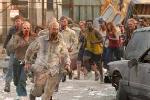
|
Peter Christelis
Code 46 |
The surprising successions of shots and the curt interruptions of emotional moments make for a tough but invigorating film. |
Niven Howie
Dawn of the Dead |
The film's redeeming force of conviction is borne out in its taut story structure and severe scene constructions. Extra points for the credits.
|
Valdis Óskarsdóttir
Eternal Sunshine of the Spotless Mind |
Sure, the byzantine structure is Kaufman's devising, but the split-second cutting on subtle gags and on piquant details in the actors' performances is the editor's nimble achievement.
|
Siddiq Barmak
Osama |
Somehow makes a compact, muscular movie out of longish scenes where little seems to happen. |
Monika Willi & Nadine Muse
Time of the Wolf |
Like Dawn, an end-of-the-world story that approximates the forward motion of apocalypse but also captures fleeting signs of humanity. |
Honorable Mentions
|
Collateral and The Bourne Supremacy were superbly assembled action films. And no one cuts like Godard, still masterly in Notre musique.
|
|
|
Best Art Direction/ Production Design
|

|
Tim Hatley
Closer |
The taste for polar contrasts—blacks and whites, and then wild neons—constantly suggests the fierce and febrile psychologies of the characters. |
Mark Tildesley
Code 46 |
Somehow with a hundredth of the budget, Code 46 envisions the future in better and wittier detail than Hollywood megaproductions. |
Huo Tingxiao
House of Flying Daggers |
The intricate colors and shapes of the costumes are brightly showcased against the gemlike colors of the natural (if digitally altered) vistas. |
Lou Romano
The Incredibles |
From the imaginative contours of the characters to the lay of the land in unknown territories, The Incredibles is full of magic. |
Matthew Davies
The Saddest Music in the World |
Guy Maddin still can't sustain a feature-length movie, but there's no second-guessing the doting detail of his gonzo-primitive fantasias. |
Honorable Mentions
|
Spring, Summer, Fall, Winter...and Spring and Spider-Man 2:
utterly dissimilar films, but expert in their uses of color and stylized locations. Proteus
and Bad Education find the right props, colors, and surfaces for intricate tales of desire.
|
|
|
Best Costume Design
|
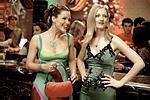
|
Beatrix Aruña Pasztor
Alfie |
In one of her two triumphs this year, Pasztor traverses the rainbow finding the perfect, pop-colored duds for sex in the city.
|
Sandy Powell
The Aviator |
Scrupulous detail can become an end in itself for Scorsese, but Powell still shows the director's tastes to his own best advantage. |
Emi Wada
House of Flying Daggers |
Much more involved than the clothes in Hero, these beautiful and elaborate costumes reflect the more complex characters wearing them. |
Sammy Sheldon
The Merchant of Venice |
Sure, sumptuous 16th-century attire is easy to overpraise, but the colors, lines, materials, and designs here are rich and quite inventive. |
Maria Bradley,
Holly Davis et al.
13 Going on 30 |
Even without a credited costume designer, the film outfits its pre-teen fantasy in the right fluorescent colors and wacko accents.
|
Honorable Mentions
|
Among the year's "period" films, A Very Long Engagement featured some memorable and character-specific ensembles, and Alfie costumer Pasztor spun a different kind of off-kilter magic for the reimagined Vanity Fair. In the present day, Napoleon Dynamite was sweet.
|
|
Sound and Music Categories
|
Best Sound
|
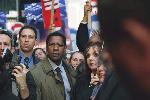
|
|
The Bourne Supremacy |
Popping, whooshing, and crashing in a frenzy, without losing the human drama.
|
|
In the Realms of the Unreal |
The multiple narrators are a canny device for grasping the uncertain identity at the story's core. The eerie soundscapes for the animated sequences haunt the whole picture. |
|
The Incredibles |
Synthesizing a likably kinetic score with a host of well-chosen sound effects, the soundtrack of The Incredibles is as smooth as the visuals are.
|
|
The Manchurian Candidate |
Somehow the densely assembled layers of airwaves chatter, news bulletins, and electronic hums capture the paranoid heartbeat that the rest of the movie is after, but usually misses.
|
|
Tarnation |
Tarnation constantly courts the boundaries of poor taste, but that tension is key to the movie. Combining 70s and 80s rock with the carefully mimicked blasts of electro-shock treatments is an emblem of the whole film's bipolarity.
|
Honorable Mentions
|
De-Lovely's experiments with anachronistic performance styles surpass all expectations, infusing the historical past with a theatrical flair that is also well-echoed in The Aviator.
|
|
|
Best Original Score
|

|
Alexandre Desplat
Birth |
While most of my nominees are funky novelties, Birth's score is grandly and rapturously symphonic, and it's easily the achievement of the year. |
Jon Brion
Eternal Sunshine of the Spotless Mind |
Gutsy, minimalist instrumentation that mostly stays in the background but still contributes the proper air of postmodern whimsy. |
John Williams
Harry Potter and the Prisoner of Azkaban |
Williams is intolerable when he isn't trying, but when his imagination is sparked, his melodies are memorable and his accenting of scenes is spot-on. |
Jon Brion
I ♥ Huckabees |
Much more brazen than the Sunshine score, the mad calliopes, accordions, and excerpted pop songs provide the fanciful, outlandish, but emotionally sincere backbone the movie needs. |
Roque Baños
The Machinist |
When in doubt, why not a theremin? Dramatic payoffs gradually dwindle in The Machinist, but the kitschy/spooky music remains transfixing. |
Honorable Mentions
|
James Newton Howard, a sometime showboater in the John Williams tradition, held our attention in just the right ways in Collateral and the otherwise laughable The Village.
|
|
|
Best Original Song
|

|
"America, Fuck Yeah!"
Team America: World Police |
The film, frankly, was a joke that didn't fly, but this tartly satiric send-up of Patriot Rock at least had you humming as you walked out of the theater. |
"Knock Yourself Out"
I ♥ Huckabees |
Like the rest of the film's infectiously oddball music, this song sounds like something alien and something familiar. The lyrics are perfect for the film. |
"Lovers"
House of Flying Daggers |
Like Daggers itself, this song risks embarrassing itself with its wild romantic aplomb. But the melody and Kathleen Battle's voice keep the song afloat. |
"Million Voices"
Hotel Rwanda |
Wyclef's song plays over the end credits of this sobering and competent but weirdly un-electrifying movie. The song brings off what the movie doesn't: a genuinely creative testimony to awful history. |
"A Waltz for a Night"
Before Sunset |
This song is too cute, in both senses of the term: a little too self-conscious of its demure appeals, but so gangly and sweet that you can't help adoring it. |
|
|
Best Sound Effects
|

|
|
The Aviator |
Some of the most obvious sound-effects cues in the movie are, to be honest, a little old-hat. We've all heard flashbulbs that sound like grenade explosions, etc. But the full sonic and visual textures of Scorsese's movies are fun to sink into, even when the grandeur of the spectacle feels heedlessly huge. In any event, the audio work on the plane flights and, even better, on the plane crash are pretty riveting. |
|
The Incredibles |
I can still hear the various sounds of Edna Mode's outfit-testing assembly line, plus the roller-coaster speed of Frozone's snowboard thingy. Every aspect of the film is a sensory joy. |
|
Kill Bill, Vol. 2 |
Vol. 2 lacks the full technical whiz-banging of the first film; the need to sober up for the heart-to-heart conclusion weighs on the whole movie. But if you've ever wondered what an eyeball sounds like being popped from its socket, and then squished underfoot, here you go. |
|
Effects Categories
|
Best Visual Effects
|

|
|
The Day After Tomorrow |
I realize the movie devolves into idiocy; some people think that it starts there. But the spidery legs of those tornadoes as they menace Los Angeles are pretty damned hard to forget. Plus, the phrase "Swimming Pool Library" will never be the same.
|
|
Eternal Sunshine of the Spotless Mind |
Why the Academy has bounced this film from competition, even at the semifinals level, is a mystery. All the surreal flourishes and decomposing sets are adroitly blended into the plot. |
Harry Potter and the Prisoner of Azkaban
|
Spider-Man 2 was a close competitor, with Doc Ock's odious tentacles, but the effects in Harry Potter were more wittily inserted into the action of a more coherent film. My favorite: the live-action "WANTED" posters of Sirius Black. |
|
|
Best Makeup
|

|
|
Alfie |
The preview audience I saw this with couldn't stop cooing. Has Jude's hair ever been more raffishly tousled? Have Nia Long or Jane Krakowski ever looked so luscious? Wasn't Sienna Miller doing a mean Jane Birkin impersonation? The hair and makeup team really earned their keep (even considering the juicy raw materials). |
|
Being Julia |
The makeup is swell in the onstage finale, but even more memorable is the resplendent, old-fashioned glamor that Annette Bening brings off throughout. That final closeup deserves its own award. |
|
The Passion of the Christ |
I'm not saying it was fun to behold, but the forensic desecration of Jim Caviezel's body was pretty impressive. And, if you're into the whole lily-white-Jesus thing, so too were his beatific interludes.
|
|
MOST NICKSFLICKPICKS HONORS
(47 of the 118 films I saw last year
are nominated for something...)
Eternal Sunshine of the Spotless Mind - 8
Code 46 - 5
Maria Full of Grace - 5
Oasis - 5
I ♥ Huckabees - 4
PURPOSEFUL NICKSFLICKPICKS OMISSIONS
(...but not these awards-bait pictures,
which I just can't get excited about)
Finding Neverland - 0
The Phantom of the Opera - 0
Ray - 0
The Sea Inside - 0
Zatôichi: The Blind Swordsman - 0
BEST FILMS WITH NO NOMINATIONS
(Woulda been nice to recognize these,
but there was just no room at the inn.)
Bad Education - 0
(Despite four honorable mentions)
Collateral - 0
Crimson Gold - 0
Father & Son - 0
The Mother - 0
The Motorcycle Diaries - 0
Primer - 0
Proteus - 0
Shrek 2 - 0
Spring, Summer, Fall, Winter...and Spring - 0
Twentynine Palms - 0
|
HONORARY AWARDS
Best Theatrical Re-Release
The Battle of Algiers
Best Voice Work
Edna Mode (voiced by Brad Bird) in The Incredibles
The Narrator (John Hurt) in Dogville
Most Complex Performances by Non-Professionals
Aileen Wuornos in Aileen: Life and Death of a Serial Killer
Lt. John Rushing in Control Room
Lila Lipscomb in Fahrenheit 9/11
Best Individual Sound Effect
The hollow, plastic bounce as Paul Giamatti throws what looks
like a terra cotta flowerpot onto the floor in Sideways
Most Hilarious Music Cue
When in Rome's "The Promise," as Napoleon Dynamite
tether-balls with his maybe-girlfriend Deb
Best Neologisms (tie)
"Fetch" and "Fuckabees!"
Most Shattering Scenes of the Year
Nicole Kidman goes to the opera in Birth
Patricia Clarkson smashing Nicole's Hummels in Dogville
Most Unexpected Female Bonding
The perfectly played pregnancy-test scene between
Uma Thurman and Helen Kim in Kill Bill, Vol. 2
Gordon Willis Award for Best Under-Lighting (tie)
Million Dollar Baby and Time of the Wolf
Most Entertaining B-Movie
The Forgotten
Most Sadly Missed on Ithaca's Screens
Moolaadé and Los Angeles Plays Itself
|

 Check out my past honorees in 1999, 2000, 2001,
2002, and 2003
Check out my past honorees in 1999, 2000, 2001,
2002, and 2003 








































 Critics and audiences have a huge, halfway understandable temptation to ascribe all of the
splendor and intricacy of Eternal Sunshine of the Spotless Mind to Charlie Kaufman's script, which perhaps explains
why he has won so many year-end critic's awards while the film itself, its director, its technicians, and its cast have all
been shortchanged. In the face of this mythology, that Kaufman somehow writes scripts that direct themselves, I am often at
pains to point out the perfect, subtle shifts in lighting schemes or the miniature brilliance that is tucked away in the corners
of the production design. All the same, it's a good thing to recall that Eternal Sunshine's glory did begin with this
script, which it's hard to imagine any other screenwriter managing to write. Sunshine lacks any discernible target
demographic and yet encompasses everyone alive within the scope of its character arcs and emotional sympathies. It's a once-in-a-lifetime
script.
Critics and audiences have a huge, halfway understandable temptation to ascribe all of the
splendor and intricacy of Eternal Sunshine of the Spotless Mind to Charlie Kaufman's script, which perhaps explains
why he has won so many year-end critic's awards while the film itself, its director, its technicians, and its cast have all
been shortchanged. In the face of this mythology, that Kaufman somehow writes scripts that direct themselves, I am often at
pains to point out the perfect, subtle shifts in lighting schemes or the miniature brilliance that is tucked away in the corners
of the production design. All the same, it's a good thing to recall that Eternal Sunshine's glory did begin with this
script, which it's hard to imagine any other screenwriter managing to write. Sunshine lacks any discernible target
demographic and yet encompasses everyone alive within the scope of its character arcs and emotional sympathies. It's a once-in-a-lifetime
script. So few plays get turned into movies anymore, and when they do, a lot of the best stuff
gets left out, reduced, or shorn of its uniquely theatrical character. Tony Kushner perpetrated all of these errors in converting
Angels in America into a script for Mike Nichols last year, even though he was lucky to have written such a goddamn
masterpiece in the first place that his work survived these losses. Patrick Marber's Closer isn't anywhere near the
play that Angels is, but its screen adaptation is much gutsier, preserving the implausible dialogue and refusing to
connect the play's tough, episodic structure into anything more forgiving. The result may not be a great movie, but it's a
very, very good one; everyone who worked on it has reckoned with the piece Marber wrote instead of figuring out how to soften
or transform it.
So few plays get turned into movies anymore, and when they do, a lot of the best stuff
gets left out, reduced, or shorn of its uniquely theatrical character. Tony Kushner perpetrated all of these errors in converting
Angels in America into a script for Mike Nichols last year, even though he was lucky to have written such a goddamn
masterpiece in the first place that his work survived these losses. Patrick Marber's Closer isn't anywhere near the
play that Angels is, but its screen adaptation is much gutsier, preserving the implausible dialogue and refusing to
connect the play's tough, episodic structure into anything more forgiving. The result may not be a great movie, but it's a
very, very good one; everyone who worked on it has reckoned with the piece Marber wrote instead of figuring out how to soften
or transform it.








